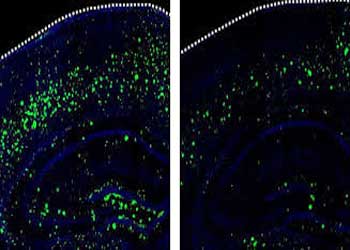- Home
- Editorial
- News
- Practice Guidelines
- Anesthesiology Guidelines
- Cancer Guidelines
- Cardiac Sciences Guidelines
- Critical Care Guidelines
- Dentistry Guidelines
- Dermatology Guidelines
- Diabetes and Endo Guidelines
- Diagnostics Guidelines
- ENT Guidelines
- Featured Practice Guidelines
- Gastroenterology Guidelines
- Geriatrics Guidelines
- Medicine Guidelines
- Nephrology Guidelines
- Neurosciences Guidelines
- Obs and Gynae Guidelines
- Ophthalmology Guidelines
- Orthopaedics Guidelines
- Paediatrics Guidelines
- Psychiatry Guidelines
- Pulmonology Guidelines
- Radiology Guidelines
- Surgery Guidelines
- Urology Guidelines
New Stroke drug may also prevent Alzheimer's disease

Researchers at the University of Southern California have found that a drug currently being developed to treat stroke patients could also prevent Alzheimer's disease. The study shows that the genetically engineered protein 3K3A-APC protects the brains of mice with Alzheimer's-like symptoms, reducing the buildup of toxic peptides and preventing memory loss. The findings of the study have been which will be published in the Journal of Experimental Medicine.
3K3A-APC is a genetically modified version of a human blood protein called activated protein C, which reduces inflammation and protects both neurons and the cells that line the walls of blood vessels from death and degeneration. 3K3A-APC has beneficial effects in various mouse models of disease, including traumatic brain injury and multiple sclerosis, and is currently being developed to treat stroke in humans, where it has been shown to be safe, well tolerated, and capable of reducing intracerebral bleeding.
"Because of its neuroprotective, vasculoprotective, and anti-inflammatory activities in multiple models of neurological disorders, we investigated whether 3K3A-APC can also protect the brain from the toxic effects of amyloid-β toxin in a mouse model of Alzheimer's disease," says Berislav V. Zlokovic, Director of the Zilkha Neurogenetic Institute at the Keck School of Medicine, University of Southern California.
Toxic amyloid-β peptides accumulate in the brains of Alzheimer's patients, leading to neurodegeneration and reduced blood flow within the brain. Zlokovic and colleagues found that 3K3A-APC significantly reduced the accumulation of amyloid-β in the brains of mice that usually produce large amounts of the toxic peptide. 3K3A-APC treatment prevented these mice from losing their memory and helped maintain normal cerebral blood flow. The drug also suppressed inflammation within the brain, another common feature of Alzheimer's disease.
Zlokovic and colleagues found that 3K3A-APC protects the brain by preventing nerve cells from producing an enzyme called BACE1 that is required to produce amyloid-β. Several different inhibitors of BACE1 have been tested in clinical trials for Alzheimer's disease, but the new study suggests that using 3K3A-APC to block the production of BACE1 could be an alternative approach, particularly at early stages of the disease when amyloid-β has yet to accumulate to levels capable of permanently damaging the brain.
"Our present data support the idea that 3K3A-APC holds potential as an effective anti-amyloid-β therapy for early-stage Alzheimer's disease in humans," Zlokovic says.
For more details click on the link: http://dx.

Disclaimer: This site is primarily intended for healthcare professionals. Any content/information on this website does not replace the advice of medical and/or health professionals and should not be construed as medical/diagnostic advice/endorsement or prescription. Use of this site is subject to our terms of use, privacy policy, advertisement policy. © 2020 Minerva Medical Treatment Pvt Ltd